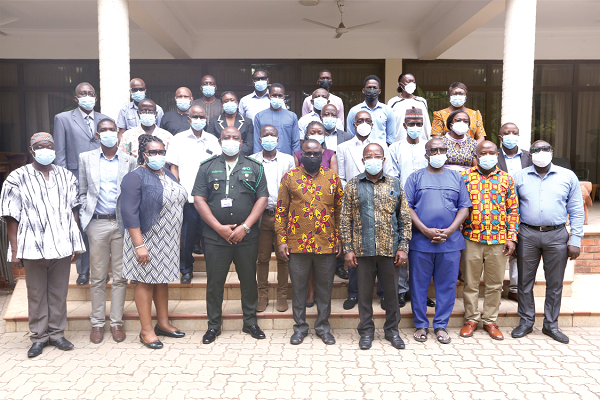
FAO supports Ghana to build capacity for veterinary officers
The Food and Agriculture Organisation (FAO) of the United Nations, through its Emergency Centre for Transboundary Animal Disease Control (ECTAD), says it will support Ghana to roll out in-service applied veterinary epidemiology training (ISAVET) for field veterinary officers.
This is to help build the capacity of the veterinary officers of the Veterinary Services Department (VSD) in disease detection and reporting so as to help improve animal health delivery in the country.
The ECTAD Country Team Leader of Ghana, Dr Garba Maina Ahmed, made the remarks at the opening of a two-day national stakeholder dialogue and advocacy on the ISAVET programme in Accra on Tuesday, May 18, 2021.
ISAVET
The ISAVET programme gives veterinary services staff the necessary epidemiological skills and competencies to carry out their responsibilities to support government services.
Field veterinarians require a number of epidemiological skills and competencies that differ from their public health counterparts and these competencies include not only the surveillance and control of zoonotic diseases, but also those of non-zoonotic animal diseases, animal production, value chains, food safety and trade regulations.
Ownership
The ECTAD Team Leader, Dr Ahmed, said the ISAVET programme was critical since it targeted veterinarians and other animal health workers (technicians, paraveterinary professionals, community animal health workers (CAHWs) in Africa with the broad goal to improve the ability of countries to prepare, prevent, detect, respond and recover from critical health threats affecting humans and animals at the human-animal- environmental interface.
He explained that “10 frontline staff of VSD will be trained as first ISAVET cohort starting in June 2021”, adding: “When trained, the filed veterinary officers will provide technical support to the Ghana government flagship programme of
“Rearing for Food and Jobs” to increase productivity of livestock in the country.”
Dr Ahmed noted further that “after one or two years of support from FAO, it is expected that VSD will sustain the training through its regular budget, in collaboration with the schools of Veterinary Medicine in the country.”
VSD needs
The Acting Director of Veterinary Services, Dr Patrick Abakah, said the ISAVET training was first piloted in October and November in 2018 in Kampala, Uganda, by the FAO.
For him, the ISAVET programme would help to train the staff of the VSD to be up to the task, pointing out that: “Currently in the Veterinary Services Directorate, the skills mix and staff strength are not commensurate with the mandate reposed in the service.”
He said knowledge development was a crucial element in the quest to tackle the numerous global public health challenges, hence it is gratifying that the attention “is being focused on veterinary workforce.”
Dr Abakan also expressed concern about the low staff strength of the veterinary service, saying that “presently, total staff strength is below 1,000 for all the categories with less than 73 veterinary surgeons in active service.”
He further expressed the worry that “Laboratory training, which is a critical tool for timely accurate diseases diagnosis, has diminished and has negatively been affected in the area of Veterinary Public Health.”
Collaboration
The Dean of the School of Veterinary Medicine of the Kwame Nkrumah University of Science and Technology (KNUST), Professor Benjamin Obukowho Emikpe, called for a closer collaboration between the VSD and training institutions, particularly the KNUST, to help bridge the gap between human resource needs of the service.
He said the KNUST was ready to develop curriculum to help train the staff of the VSD in the required and needed areas.
Training essential
For his part, the Chairman for the event, Professor Kobina Turkson, who is also the Dean of Veterinary Medicine, College of Basic and Applied Sciences of the University of Ghana, urged the Veterinary Services Department to, as a matter of urgency, prioritise in-service training programmes to equip its staff with the needed competencies to ensure the safety of animals and animal products in the country.
He expressed the concern that in-service training had been one of the major challenges confronting the VSD, noting that it was only through training that the VSD would be able to carry out its mandate efficiently and effectively.
For him, in-service training was critical for the development of staff competencies in any organisation and that the VSD was no exception.